第四讲正说反译、反说正译法
- 格式:doc
- 大小:34.00 KB
- 文档页数:2
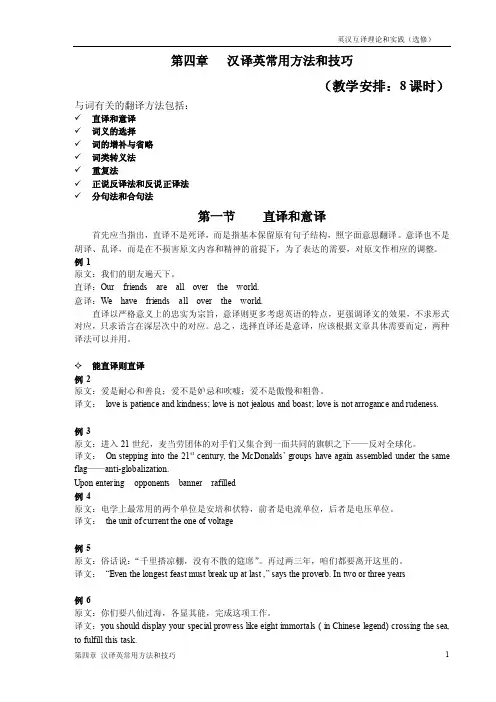
第四章汉译英常用方法和技巧(教学安排:8课时)与词有关的翻译方法包括:✓直译和意译✓词义的选择✓词的增补与省略✓词类转义法✓重复法✓正说反译法和反说正译法✓分句法和合句法第一节直译和意译首先应当指出,直译不是死译,而是指基本保留原有句子结构,照字面意思翻译。
意译也不是胡译、乱译,而是在不损害原文内容和精神的前提下,为了表达的需要,对原文作相应的调整。
例1原文:我们的朋友遍天下。
直译:Our friends are all over the world.意译:We have friends all over the world.直译以严格意义上的忠实为宗旨,意译则更多考虑英语的特点,更强调译文的效果,不求形式对应,只求语言在深层次中的对应。
总之,选择直译还是意译,应该根据文章具体需要而定,两种译法可以并用。
✧能直译则直译例2原文:爱是耐心和善良;爱不是妒忌和吹嘘;爱不是傲慢和粗鲁。
译文:love is patience and kindness; love is not jealous and boast; love is not arrogance and rudeness.例3原文:进入21世纪,麦当劳团体的对手们又集合到一面共同的旗帜之下——反对全球化。
译文:On stepping into the 21st century, the McDonalds’ groups have again assembled under the same flag——anti-globalization.Upon entering opponents banner rafilled例4原文:电学上最常用的两个单位是安培和伏特,前者是电流单位,后者是电压单位。
译文:the unit of current the one of voltage例5原文:俗话说:“千里搭凉棚,没有不散的筵席”。
再过两三年,咱们都要离开这里的。
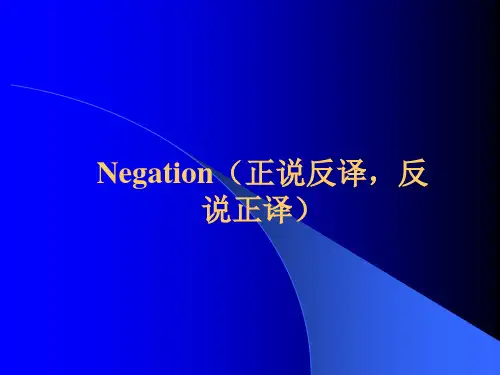
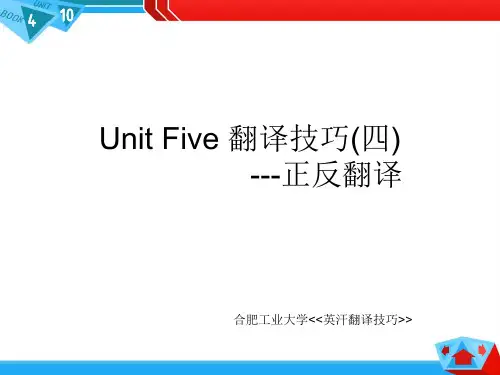

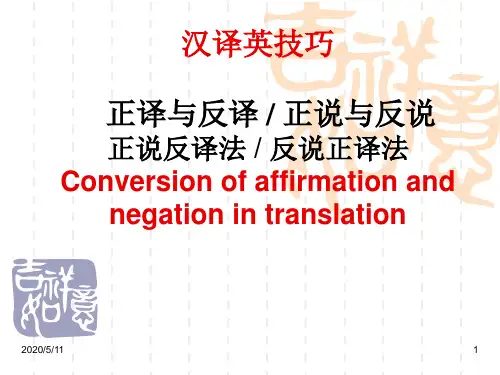
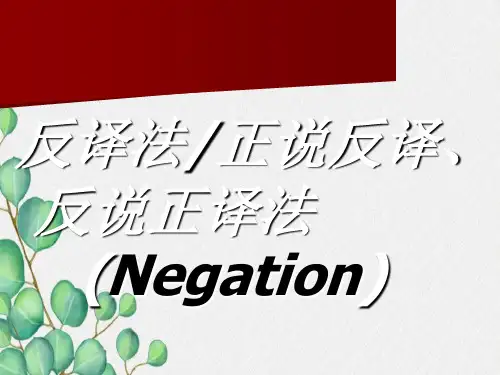
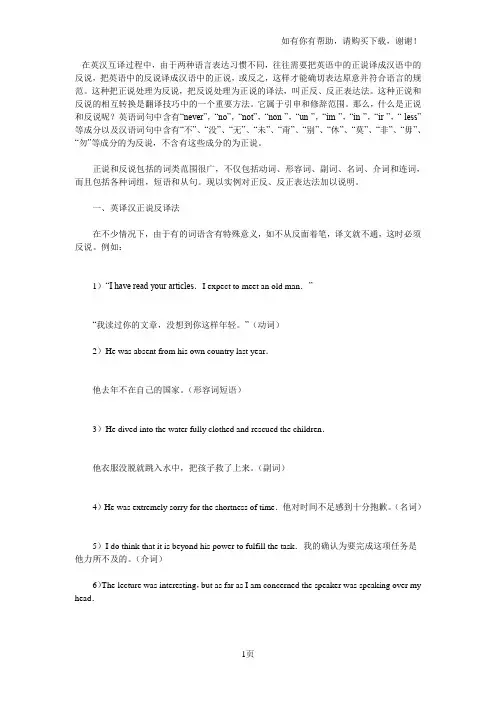
在英汉互译过程中,由于两种语言表达习惯不同,往往需要把英语中的正说译成汉语中的反说,把英语中的反说译成汉语中的正说,或反之,这样才能确切表达原意并符合语言的规范。
这种把正说处理为反说,把反说处理为正说的译法,叫正反、反正表达法。
这种正说和反说的相互转换是翻译技巧中的一个重要方法。
它属于引申和修辞范围。
那么,什么是正说和反说呢?英语词句中含有“never”,“no”,“not”,“non-”,“un-”,“im-”,“in-”,“ir-”,“-less”等成分以及汉语词句中含有“不”、“没”、“无”、“未”、“甭”、“别”、“休”、“莫”、“非”、“毋”、“勿”等成分的为反说,不含有这些成分的为正说。
正说和反说包括的词类范围很广,不仅包括动词、形容词、副词、名词、介词和连词,而且包括各种词组,短语和从句。
现以实例对正反、反正表达法加以说明。
一、英译汉正说反译法在不少情况下,由于有的词语含有特殊意义,如不从反面着笔,译文就不通,这时必须反说。
例如:)“I have read your articles.I expect to meet an old man.”我读过你的文章,没想到你这样年轻。
”(动词))He was absent from his own country last year.他去年不在自己的国家。
(形容词短语))He dived into the water fully clothed and rescued the children.他衣服没脱就跳入水中,把孩子救了上来。
(副词))He was extremely sorry for the shortness of time.他对时间不足感到十分抱歉。
(名词))I do think that it is beyond his power to fulfill the task.我的确认为要完成这项任务是他力所不及的。
(介词))The lecture was interesting,but as far as I am concerned the speaker was speaking over my head.这讲座很有趣,但对我来说,讲座太深了,听不懂。

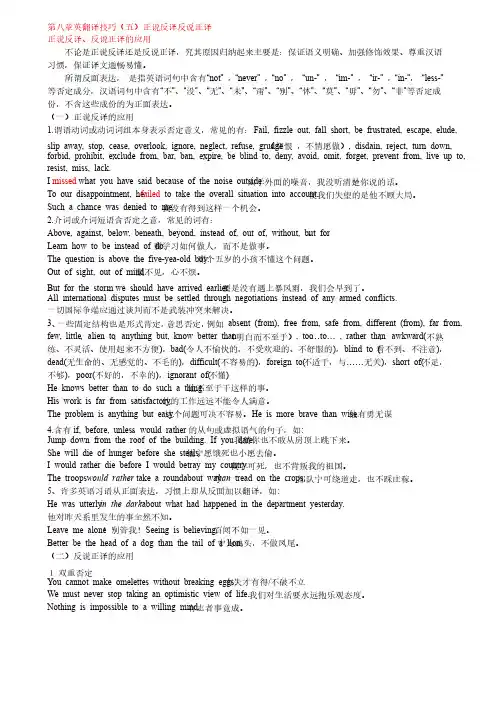
第八章英翻译技巧(五)正说反译反说正译正说反译、反说正译的应用不论是正说反译还是反说正译,究其原因归纳起来主要是:保证语义明确、加强修饰效果、尊重汉语习惯,保证译文通畅易懂。
所谓反面表达,是指英语词句中含有“not”,“never”,“no”,“un-”,“im-”,“ir-”,“in-”,“less-”等否定成分,汉语词句中含有“不”、“没”、“无”、“未”、“甭”、“别”、“休”、“莫”、“毋”、“勿”、“非”等否定成份,不含这些成份的为正面表达。
(一)正说反译的应用1.谓语动词或动词词组本身表示否定意义,常见的有:Fail, fizzle out, fall short, be frustrated, escape, elude, slip away, stop, cease, overlook, ignore, neglect, refuse, grudge(怨恨,不情愿做), disdain, reject, turn down, forbid, prohibit, exclude from, bar, ban, expire, be blind to, deny, avoid, omit, forget, prevent from, live up to, resist, miss, lack. I missed what you have said because of the noise outside.由于外面的噪音,我没听清楚你说的话。
To our disappointment, he failed to take the overall situation into account. 使我们失望的是他不顾大局。
Such a chance was denied to me.我没有得到这样一个机会。
2.介词或介词短语含否定之意,常见的词有:Above, against, below, beneath, beyond, instead of, out of, without, but for。
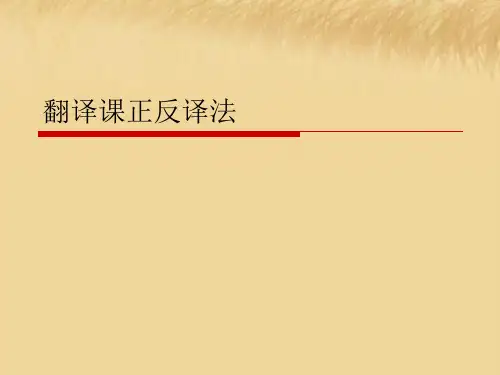
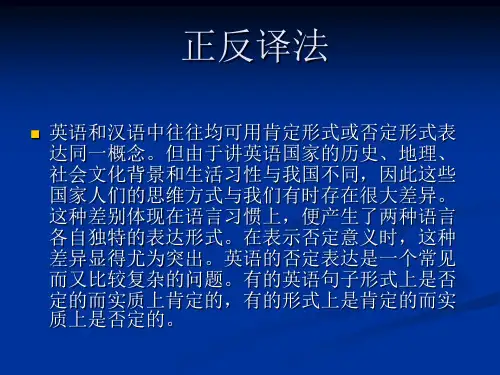
正说反译与反说正译英语和汉语有相同之处,那就是在表达同一事物或同一概念时,往往可以从正面叙述,也可以从反面叙述。
比如我们可以说“很困难”(quite difficult),也可以改成“很不容易”(far from easy);说做某事“竭尽全力”(do one’s best),也可以说“不遗余力”(spare no effect);可以说某个学生成绩“还好”(good),也可以说“不错”(not bad)。
但由于思维方式的不同,英语中有些从正面表达的东西在汉语中习惯从反面表达;而有些从反面来表达的东西在汉语中则习惯从正面来表达。
因此,英译汉时常常有必要进行转换。
这就是通常所说的“正说反译与反说正译”法。
如英语中的“wet Paint!”,汉语中常说成“油漆未干”,英语中说“I won’t keep you waiting long ”汉语中却说“我一会而就回来。
”1、正说反译:Miss the bus没有赶上车Live up to the expectations of my parent不辜负父母的期望Be absent from the meeting没有出席会议A final decision不可更改的决定Frost-free refrigerator无霜冰箱Freeze别动Mortally ill不治之症The window refuses to open窗户打不开The explanation is pretty thin这个解释站不住脚Beauty is but skin deep.美丽但不肤浅。
Opportunity knocks but once.机会只来一次。
Keep upright切勿倒置。
Agreeable sweetness甜而不腻。
I doubt it我不相信。
Mind your steep当心脚下。
2、反说正译:The specification lacks detail.说明书不够详细。
Negation (正说反译、反说正译法)
The English language has its peculiarities in negation. Of course, English-speaking people have their own way of thinking in the negation and expressing negative implications. What is affirmative in form in English may be implied something negative in Chinese, and vice versa. The use of “yes” and “no” is a case in point.
1.--“Are you not going tomorrow?”
--“No, I’m not going.”
2. “I don’t think you’re right in this point.”
Discussion: “你是人,你不是东西。
你是东西吗?你真不是东西!?我认为你不是东西。
你算什么东西!”
Version: You’re a person, not a thing. Aren’t you a person/a thing? Are you reliable/ some-thing? No, I don’t think so./Yes, I think so. What a creature you are! What a fool you are! You are a sheer idiot. I think you are an idiot. I don’t think you are tr ustworthy. You, really, are nothing. You think you are something. No, far from it.
Purposes of Affirmation and Negation
1. to make the meaning clear,
2. to strengthen the rhetorical effect,
3. make it conform to the idiomatic use of the target language
A. Some Idiomatic Expressions
1. riot police 防暴警察(即anti-riot police,而不是暴乱的警察)
2. crisis law 反危机法案(即anti-crisis law)
3. spy film 反谍影片
4. After you, sir. 先生,您先请。
5. 路上辛苦了。
原译:You must have had a tiring journey.
改译:Did you have a good trip?
6. Keep in lane! 不准换线!
7. Keep off the lawn! 请勿践踏草地!(正说反译)
8. I couldn’t agree more with you. 我完全同意你的看法。
9. Just make yourself at home. 不要客气。
/别见外
10. He was the last man to say such things. 他绝不会说这样的话。
B. Negation--Affirmation
1. Isn’t it funny! 真逗!
2. When Stephen was introduced to the old couple, they said simply, “We’ve read your article. We expected to meet an older man.”
当史蒂夫被介绍给这对老年夫妇的时候,他们只是淡淡地说:“我们看过你的文章,但没想到你这么年轻。
”
3. The thought of returning to his native land never deserted him.
归国的念头始终萦绕在他的心中。
C. Affirmation--Negation
4 .That’s a thing that might happen to any man.
原译:这样的事情可能发生在任何人身上。
改译:这种事情谁也难免。
5. His speech leaves much to be desired.
他的讲话很不如人意。
6. Appearances are deceptive.
外貌是靠不住的。
D: The Shift of Perspective (视角转换)
7 .Good winner, good loser.
胜不骄,败不馁。
8. 在美国,人人都能买到枪。
原译:In the United States, everyone can buy a gun.
改译:In the United States, guns are available to everyone.
9. The darkness was thinning, but they were still in bed.
天渐渐有些亮了,但他们还在睡。
练习
1.I have failed to convince him of his error.
2.The teacher found some of the students absent.
3.His answer is beside the mark.
4.They never see each other without talking about Super Girl's V oice.
5.The County Party Committee there is ignorant of conditions at the lower lever.
6.That fellow is far from being honest.
7.She refrained from laughing.
8.All graduates from the Foreign Languages Institutes will not be appointed to do
translation work.。